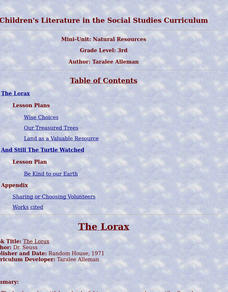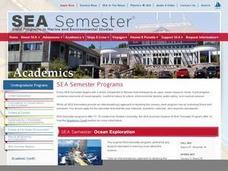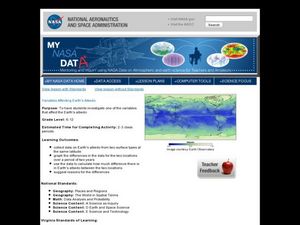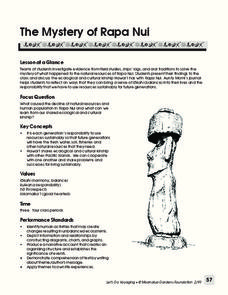Michigan Sea Grant
Water Quantity
It may be tricky for a young mind to conceptualize that less than 1% of all water on earth is useable for humans to drink. Simulating the amount of fresh water available on earth by removing measured amounts of water from a five-gallon...
Curated OER
Going...Going...
Students investigate equilibrium in erosion and deposition by predicting effects of moving water on soil; modeling an erosion simulation; observing results of a test; inferring causes and effects, and hypothesizing about erosion variables.
Curated OER
Land as a Valuable Resource
Students investigate why the soil is important to our lives. In this natural resources lesson, students have a farmer as a guest speaker. Students begin to understand how farmers use and protect our natural resource. Students write...
Curated OER
Lead Extraction
Students investigate one method used in the detection of lead in the soil. They use a Lead Check Soil Kit to safely obtain results in 30 minutes or less in levels of 400 ppm or above. In addition, they write a brief description of what...
Virginia Department of Education
The Hydrologic Cycle
There is the same amount of water on earth now as there was when it was formed. The water from your faucet could contain molecules that dinosaurs drank! Young scientists build their own hydrologic cycle model and observe...
Virginia Department of Education
Adaptation and Evolution
Um may be the atomic symbol for confusion, but it won't be needed in this lesson. Scholars rotate through seven stations completing experiments, hands-on activities, writing exercises, and analysis. Stations include material on...
Virginia Department of Education
A-Mazing Plants
Have your young scientists questioned why plants grow a particular way? Through this learning opportunity, scientists gain firsthand knowledge about how plants develop and various factors that affect rates of growth as they bring plants...
Curated OER
Forest Ecosystem Field Trip
Students investigate the environment by participating in a class field trip. In this botany lesson, students attend a field trip through their local park or forest while listening to a nature guide. Students practice using their 5 senses...
Curated OER
Forest Ecology
Learners examine the different plants and animals in British Columbia. In this forest ecology lesson students explore how ecosystems work, classify animals and investigate food webs and chains.
Curated OER
Decomposers- Nurse Logs
Students investigate temperate forest ecosystems. In this environmental activity, students discover different forms of decomposition and its effect on the environment.
Curated OER
Worms! Nature's Recyclers
Third graders explore the process of composting. In this composting lesson, 3rd graders read the book Wonderful Worms, and create composters.
Curated OER
They're Tilling that Field Behind the Mall
Unfortunately, the article for which this resource was written is not available. You can, however, find another current document on agriculture and urban development for your class to read together, and then still follow the suggested...
Curated OER
Changing Planet: Permafrost Gas Leak
Pair earth scientists up to use an amazing online arctic portal mapping tool and Google Earth to analyze permafrost changes. They compare changes to data on atmospheric concentrations of methane to see if there is a correlation. Then...
Curated OER
Sampling the Ocean Floor
Students sample goodies from an unseen ocean floor and try to accurately describe their composition. This simulation helps students explain the limitations of sampling and the problem of obtaining representative samples of sea floor...
Curated OER
What Is Natural?
Your junior highers will learn about which objects are natural and classify objects as abiotic or biotic. Your class will trace human products to their natural resources using matter cycles and then create their own definition of nature.
Curated OER
Variables Affecting Earth's Albedo
Students study the variables that affect the Earth's albedo. In this environmental data analysis lesson students interpret and graph information and calculate changes.
Captain Planet Foundation
Energy Flow in the Garden
How can you tell what an owl has eaten? Study the food chain and flow of energy in an ecosystem by dissecting an owl pellet and noting the bones found inside. Additionally, the lesson includes a game about consumers and producers with a...
Teach Engineering
Are We Alone?
Find an answer to the age-old debate of whether life exists on Mars. Groups determine criteria to help look for signs of life on Mars. The activity has the class simulate testing Martian soil samples for signs of life before drawing...
Teach Engineering
Messin' with Mixtures
Do you separate your trail mix before eating it? Then you've been separating mixtures your whole life! Scholars model a contaminated soil sample using trail mix and estimate the percentage of each component. They consider how to clean up...
Curated OER
All Mixed Up!
What happens when solids are added to liquids? After reading an informative paragraph about solutions, learners answer six true/false questions regarding solutions, and what substances will dissolve into liquids they are mixed with. A...
Curated OER
Whose Home Is This?
After reading a short and informative paragraph on animals and their environments, learners look at pictures of four animals, and write a short description of how each one has adapted to its environment. A suggested activity is that each...
Curated OER
The Plant Food Factory
Plants need sun and water to survive. Let kids discover these facts by reading a block of informational text and considering a scientific quandary. They read the text, then use the information to complete a two-part question about plant...
Moanalua Gardens Foundation
The Mystery of Rapa Nui
What caused the collapse of the environment on Rapa Nui (Easter Island)? Who constructed the Moai? What was their purpose? Class members assume the role of investigators and use evidence drawn from field studies, ships' logs, and...
Curated OER
Be Kind to Mother Nature!
A clever worksheet on identifying things that harm the environment is here for you. Elementary schoolers read a short paragraph describing the harm that can come to the environment due to human activities. Then, they must circle five...























